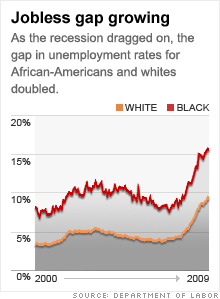Black unemployment 'a serious problem'
Despite falling unemployment rates overall, African-Americans face the biggest uphill battle in their search for employment.

NEW YORK (CNNMoney.com) -- While the overall unemployment rate for Americans fell in November, the jobless gap between African-Americans and all other races actually rose, continuing a disturbing trend that has many lawmakers up in arms.
The black community has suffered the hardest during the economic downturn, with an unemployment rate that currently stands at 15.6%. That's a much higher rate than for all of the other races that the Labor Department tracks, including Hispanics (12.7%), whites (9.3%) and Asians (7.3%).
The jobless rate for blacks has also grown much faster than for other races.
The difference between the unemployment rates for blacks and whites fell to an all-time low of 3.5 percentage points in August 2007. As the economy fell into a recession, that gap rapidly grew. By April 2009, the gap hit a 13-year high, doubling to a staggering 7 percentage points.
Though the separation between white and black jobless rates has narrowed slightly since the spring, it is still trending higher, rising to 6.3 percentage points in November from 6.2 points in the previous month.
The trend has many in Washington heated.
"We're so focused on 'too big to fail' that we're treating this issue as 'too little to matter,'" said Rep. Emanuel Cleaver, D-Mo., chairman of the Congressional Black Caucus' jobs task force. "We have a serious problem, and the army of the unemployed is growing darker by the month."
Cleaver said the main reason for such a high rate of black unemployment is a lack of opportunities for proper job training in urban communities. That's an issue that the Obama administration says it is working on with stimulus money and other government-funded programs.
"Traditionally, these groups are most impacted when there's a recession," Secretary of Labor Hilda Solis told CNNMoney.com.
Solis said that through stimulus and Labor Department grant programs, the government has targeted job training in communities with high unemployment, particularly heavily urban communities with high concentrations of African-Americans and Latinos.
"We have had some success in doing that, but of course we have a long way to go," Solis said.
But Rep. Maxine Waters, D-Calif., argued that many of those programs are wasted money. She said a large amount of government dollars are spent on funding private post-secondary schools that are targeted to urban communities, and she believes the schools are "rip-offs."
"They're soliciting people to sign up for training on job titles that don't widely exist like 'nurses assistants,'" said Waters, also a member of the Congressional Black Caucus. "That money should be used for training for jobs that will be around in the new economy like green jobs and new technologies."
Furthermore, Rep. Cleaver noted that 50% of the nation's foreclosures are on homes owned by African-Americans, which makes the jobs situation for blacks all the more urgent.
"If you're in a training program and you have a notice that you'll be kicked out of your house if you don't make your payment in two weeks, chances are high that you're going to quit the training program," Cleaver said. "We need some immediate help from a program where the government funds municipalities and non-profits to hire individuals to do real work right now."
That theme was echoed by entrepreneur and former basketball great Magic Johnson, who attended President Obama's jobs summit on Thursday. Johnson said that training is key to narrowing the unemployment gap, but the government must create plans that are targeted to specific racial and ethnic communities that have different labor issues.
"We have to find a way to give these [African-American] people a skill to put them to work," Johnson told CNN's Larry King on Thursday. "We have to come up with a general plan, a Latino plan and an African-American plan because that general plan won't affect our community."
Training is not the only hurdle that needs to be crossed in order to narrow the jobless gap among races, Education presents another challenge. There remains a high degree of inequality in employment for blacks and whites who have received equal education.
The rate of unemployment for whites with a college degree is 4.3%, but for blacks, it is 5.8%. For those with a high school diploma but no college, the unemployment rate is 9.1% for whites and 15% for blacks.
"We don't like to talk about it, but there's still discrimination in our society," said Waters. "Black college graduates can't get professional jobs as easily as whites. We have blacks disguising their voices on the telephone or trying to hide their blackness in responding to job announcements. It's real."
Waters said that when Obama became the first African-American president, there was a great hope in the black community that some myths and stereotypes about blacks would cease. But racism isn't something that can be easily overcome, Waters said.
However, there are steps that African-Americans can take take to improve their job situation, the Congresswoman added. For example, she encourages the unemployed members of the black community who have been unable to find work in their fields to take risks in their job searches.
She suggested some people opt for less desirable jobs, even if they consider the jobs "beneath them," so they can look for work while still earning a paycheck.
For others, she urged people to interview for jobs slightly above their qualifications and offer to take less money while they are in training. Lastly, she encouraged African-Americans to consider moving if there are no jobs in their areas.
"You have to survive, you have to keep going," Waters said. "Be persistent in what you do, and take a chance. A lot of that really works." ![]()


